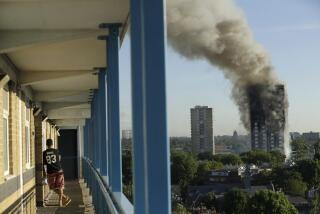Rail Disaster Negligence, Gorbachev Says
- Share via
MOSCOW — President Mikhail S. Gorbachev admonished a nation in mourning Monday that his efforts to reform the country would fail unless workers put an end to the sort of negligence that apparently caused the deaths of hundreds when two trains were swallowed up in a mile-long wall of flames a day earlier.
“How can it be that again there is incompetence, irresponsibility, mismanagement, disgrace?” Gorbachev asked, appearing to refer to accidents which have marred his rule, such as the 1986 Chernobyl nuclear power plant explosion in the Ukraine that cost the lives of 31 people.
“There will be no progress in the country if we have such laxity which leads to tragedies, both human and economic,” he said. “We will have to learn hard lessons from what has happened.”
Gorbachev said workers had been aware that the gas was leaking but merely turned up the pressure on the pipeline.
Tass reported Monday evening that the latest tally of the victims showed 462 people were dead or missing after Sunday’s train tragedy, not counting those who died after reaching hospitals.
It said 706 people were admitted to hospitals after the accident, 53 died before they could reach hospitals, 137 bodies were found at the accident site and another 272 were missing.
‘Some Died During the Day’
But of those in hospitals, “some were in grave condition and some died during the day yesterday (Sunday),” said Gorbachev, who flew to the accident scene Sunday morning and returned to Moscow the same day.
The accident occurred when a cloud of liquid petroleum gas that had leaked from a pipeline next to the Trans-Siberian Railway exploded before dawn as two trains were passing in opposite directions in the Ural Mountains, about 750 miles southeast of Moscow.
Gorbachev’s stern comments about negligence, broadcast live over television and radio, came in a brief report he gave about Sunday’s accident to the new Congress of People’s Deputies.
The delegates assembled in the Kremlin’s Congress of Palaces then observed a moment of silence and adjourned to commemorate an official day of mourning for the victims, canceling the rest of the day’s session. “How can we debate at a time like this?” Gorbachev said.
The national flag flew at half-staff over the Kremlin, and black-fringed flags hung on Moscow streets.
‘Ignited by Spark’
Referring to the gas leak, Gorbachev told the deputies: “Everything started to accumulate, and when this mass reached the level of electrical train contacts, a spark ignited this condensed cloud.”
The explosion had the force of a 10,000-ton bomb and flattened all trees within more than two miles, Col. Gen. Mikhail A. Moiseyev, army chief of staff, told Tass.
The two locomotives and the two trains’ 38 cars were blown off the tracks and engulfed in towering flames that extended for a mile, according to Monday’s editions of the official government daily newspaper Izvestia.
News reports about the accident were as open as ever seen in the Soviet Union, with the television evening news program “Vremya” broadcasting graphic pictures from the scene within 24 hours of the explosion and showing additional pictures Monday night of severely burned victims.
Gorbachev clearly intended to channel public horror and outrage over the explosion to hammer home his message about the need for greater worker responsibility.
Workers Had Been Alerted
He said the pipeline had been leaking for hours before a spark touched off the explosion. Workers had been alerted to a problem when monitoring equipment showed a drop in pressure in the pipeline.
Instead of looking into the problem, Gorbachev said, a worker simply turned the pressure up to keep gas moving in the 1,150-mile line that runs from western Siberia to European Russia.
The result was a still faster leak of gas from the pipeline, which was about 800 yards from the tracks.
“Long before the explosion, the people living in the nearby settlements and villages detected the strong smell of gas in the air. That information was given by the people to the authorities at 9 p.m. (Saturday), long before the accident occurred just after 1 a.m. (Sunday),’ Izvestia said.
“Instead of looking for the break and eliminating the leak, somebody increased the pressure in the pipeline and the gas continued flowing through the pipeline and leaking into the valley,” Izvestia said.
In addition, Gorbachev said, the two trains had made an unscheduled stop near each other at the accident site, although it was not clear why. The blast apparently occurred when at least one of the trains started moving again.
He said members of a government-appointed investigating commission would examine why no attempt was made to discover the leak in the gas pipeline and why the two trains made unscheduled stops at the same place.
The engine driver of one of the trains, 34-year-old Victor Bezverkhy, may provide some answers. He “survived by miracle” and managed to crawl to the nearest village to report the accident, Tass said Monday.
Another survivor, army officer Valery Chernykh, told Tass he became aware of an acrid smell while standing at a window of one of the trains.
“I sensed there must be something wrong, but before I could do anything there was a glow and a thundering explosion,” he said. “I covered my face with my hands but then there was another explosion and I fell. . . . I managed to get out of the burning car through a shattered window.”
More to Read
Sign up for Essential California
The most important California stories and recommendations in your inbox every morning.
You may occasionally receive promotional content from the Los Angeles Times.












